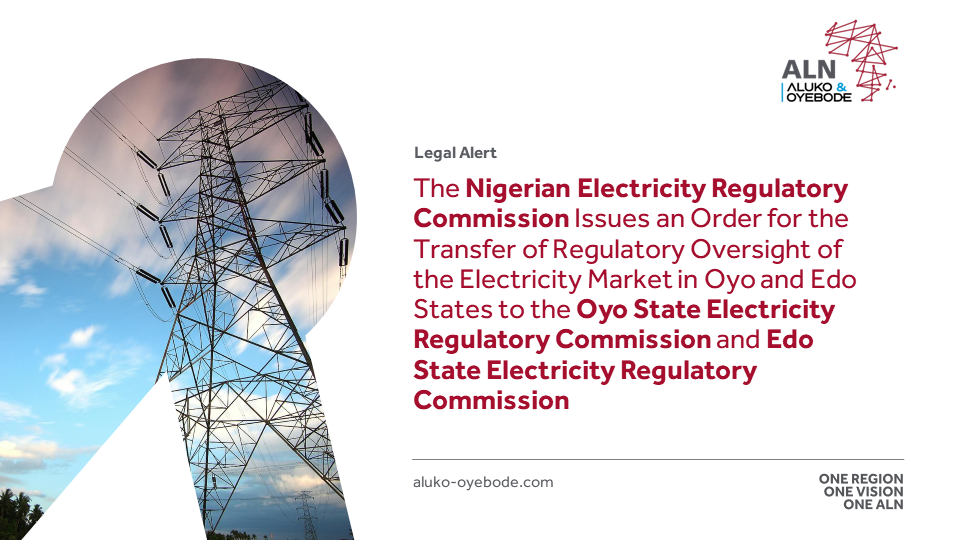
The Nigerian Electricity Regulatory Commission Issues an Order for the Transfer of Regulatory Oversight of the Electricity Market in Oyo and Edo State
ALN Nigeria | Aluko & Oyebode
Aluko & Oyebode is a top-tier Nigerian law firm, providing world-class legal services to local and international clients
As part of the process of reformation of the electricity sector in Nigeria, the Nigerian Electricity Regulatory Commission (the “NERC”) pursuant to the powers conferred on it by section 230 of the Electricity Act 2023, issued orders for the transfer of regulatory oversight of the electricity market from NERC to the Oyo State Electricity Regulatory Commission (the “OSERC”) and the Edo State Electricity Regulatory Commission (the “ESERC”).
The OSERC is set to regulate the electricity market in Oyo State while the ESERC will take over the regulation of the market in Edo State. At the completion of the transfer of regulatory authority, the OSERC and ESERC will be empowered to grant licences and provide for the regulatory frameworks for mini-grids, Independent Electricity Distribution Network/ Independent Electricity Distribution Network Operators, and Independent Electricity Transmission Network/Independent Electricity Transmission Network Operators within their respective states.
The transfer will empower the OSERC and ESERC to regulate investment into electricity utilities within their states. The purpose of this reform is to create a competitive edge as state governments will be at liberty to implement the best investment policies to attract investors into the electricity markets in their states.
A key implication of this regulatory transfer is the dual regulatory regime it imposes in certain circumstances. ?Where the operations of the licensees - electricity generation, transmission, and distribution undertaking within Oyo and Edo states - involve reliance on any part of the national grid, or other interstate sources of generation, the approval of the NERC, and the OSERC or ESERC as applicable will be required to be obtained. However, where the activity is limited within the state, the OSERC or ESERC will remain the sole regulator. ?This will require distribution networks operating within these states to delineate their networks as standalone networks within the state boundaries and the state regulation will need to install boundary meters at all border points where the electricity network crosses from their state into another state.
领英推荐
In addition, the end-user tariff methodology applicable in the Oyo and Edo states will be determined by OSERC and ESERC respectively, and all tariff policy support for end-user customers shall be the responsibility of each state government. This gives the state governments the opportunity to promote sustainable tariff policies to further enhance their economic development.
As part of the transition process, the Ibadan Electricity Distribution Plc (“IBEDC”) and the Benin Electricity Development Plc (“BEDC”) as the relevant successors of the electricity distribution licensees for Oyo State and Edo State will have to incorporate subsidiaries (respectively known as “IBEDC SubCo” and “BEDC SubCo”) which will assume the responsibilities for the intrastate supply and distribution of electricity within their states. The implication of existing contractual and financial obligations of these entities to third parties in these transfers is yet to be determined.
For more information, please contact:
Oludare Senbore , Partner | Cephas Caleb , Partner | Elijah Joseph , Associate | Stephen Ezekeoma , Associate
Intern @BarErudite|| Legal Researcher|| Legal Writer|| Social Media Manager|| Content Creator|| Writer|| Poet|| Graphics Designer...
3 个月Quite interesting. However, and as lee as this new power transfer seems to envisage state autonomy - the Nigerian Electricity problem is still in no way half-solved. The tariff is way to overhauling on an average Nigerian.